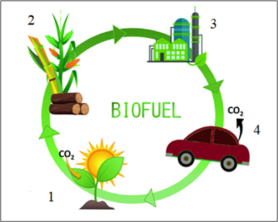Green on the Go
The search for cheaper biofuels
Were you also so shocked when you went to refuel this week? “Petrol price in the Netherlands has already reached a record”, was also reported last week in Autoblog.nl. And no, it’s not a record low, but you probably already thought that. How could the petrol price be reduced? A research group at the University of York in England may have an answer. They discovered a new substance that makes the breakdown of vegetable waste more efficient. This discovery could help make biofuel production more profitable, and thus lower the price of biofuel.
What is biofuel?
Biofuel is intended as an alternative to fossil fuels, such as petrol or diesel. You may not know it, but when you refuel, you already use a little biofuel yourself. A small percentage of biofuel is already added to both the petrol and diesel that you fill up at the pump. According to the ANWB, Euro98/E5 consists of a maximum of 5% biofuel and the rest is fossil fuel, and Euro95/E10 consists of 10% biofuel.
Biofuel is made from plant material. The image below explains the production process. Crops, such as maize and sugar beet, are produced and then converted into biofuel in a factory. This is in turn used as fuel for cars, for example.

Adapted image from the book “Microbial Bioresources for Biofuels production” by E. de Souza Candeo; The image shows how biofuel is made. Plants absorb CO2 gas from the air to grow (1). The mature crops (2) can be used and converted into biofuel (3) in the factory. This biofuel can be used as fuel for your car (4). If the car emits CO2 again, it can be used again by the plant.
Unfortunately, this way of producing biofuel has several drawbacks. This method competes with the food industry, because crops such as maize and sugar beet are also used for food. In addition, it is expensive, as agricultural land is needed to grow the crops.
A double discovery for more efficient biofuel production
A cheaper production method would be to make biofuel from plants from agricultural waste. This has the advantage that no agricultural land is needed, since it is a by-product of other processes. In addition, there is a continuous supply of plant waste from the other agricultural and plant production processes. But plant waste is fairly ‘tough’ and therefore difficult to break down. This makes it very expensive to break down, so that this production method is hardly used at the moment. This is therefore an important bottleneck for cheaper production of biofuel.
Fortunately, a group of researchers at York University in England has found a new way to more efficiently produce biofuel from plant waste. She discovered that a particular fungus called Gravium was very good at breaking down grain waste. In addition, they discovered that this fungus produced a hitherto unknown enzyme. An enzyme is a substance that speeds up chemical reactions. And with the help of this enzyme, the production of biofuels can become more profitable in several ways. The enzyme can break down the tough part of the plant, called lignin. Moreover, it breaks down this lignin in such a way that other substances can be extracted that can also be used in making new drugs in cancer and diabetes research!
The quest from sea creature to fungus
According to researcher Neil Bruce, professor of biotechnology, this discovery was quite a quest. So it took a while before they got to the fungus. ‘We looked at insects, sea creatures that live on wood, and micro-organisms.’ Until they found this fungus that grew on grain waste. “It was clear there was something special about this fungus and the enzymes it produced. The fungus produced 60 unknown enzymes, all of which play a role in the breakdown of plant waste, but what they do is not yet known. So that will keep me busy until I retire, this one fungus,” Neil says with a laugh.
 Image from York University website, Professor Neil Bruce
Image from York University website, Professor Neil Bruce
Since the current research focuses only on grain waste, Neil and his colleagues are already investigating whether this method also works for other types of plant waste. ‘Millions of tons of rice waste are incinerated in Southeast Asia. And then I think “What a shame! That could certainly be used to make biofuel,” says Neil. That is why the researchers are currently growing the fungus on all kinds of plant waste to find out which enzymes are suitable for breaking down other types of plant waste, such as rice waste.
Why biofuels are important
This research is an important step towards making the biofuel production process cheaper. This is not only beneficial for our wallets, but also because the use of fossil fuels must be reduced. For example, world leaders met this week in Glasgow to make agreements to reduce the use of fossil fuels, the NRC writes. Professor Neil Bruce is also convinced of the switch to biofuel ‘It is essential. It will have to happen. We can no longer drive on fossil fuels.”
So can I empty all my own GFT bin in my car?
Unfortunately, turning over your own moldy GFT waste and throwing it in your car in the hope of making cheaper petrol yourself does not make much sense. That plant waste is too variable to be used for this. It does make sense to keep an eye on when petrol with higher biofuel contents, such as E85 fuel (85% biofuel), comes on the Dutch market.

